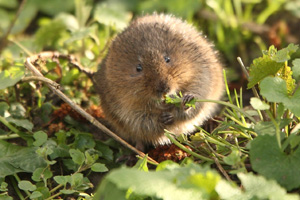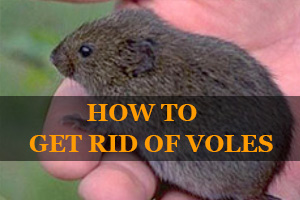Have you ever heard of Voles ? Many of us even go our whole lives without even having awareness about voles. Some people even misunderstood voles with moles after noticing damage in their lawns. Voles are a part of the rodent family possessing tiny eyes, and small ears and are capable of creating tunnels in your big lawn. This is a burrowing, furry animal around 5 inches long. Voles usually feed on vegetables and plants so if someday you notice half-eaten grass; now you know the victim here! You will need to hire professional Voles pest control exterminators to remove voles. They tend to pull vegetables down under the soil where they can enjoy their meal silently. Of course, they have teeth and are capable of biting but they hardly can cause any threat to humans.
Voles are extensively alarmed creatures and there are low chances that will bite you. On that account, voles cannot be proven to be a threat to human beings. Opposingly, these drilling rodents can cause disaster to plants and your lawn. Voles are capable enough to wipe off the entire plantation in the yard within a few hours. No matter what they need to be removed from your beautiful yard with the support of professional Voles pest control exterminators. They love bubs, roots, and grass in their meals while converting your green lawn into barren land. Thus they constitute to be a significant threat to your plants. Voles tend to attack the roots of plants, which ultimately leads to the death of plants. Luckily, you are safe they won't bite you.

A vole burrows into the root system of a shrub or tree, causing young foliage to die back or begin to tilt. Besides eating tree trunks, voles damage perennials such as potatoes, spring bulbs, and hostas by chewing on their roots. However, they mostly eat grass stems and blades. You'll have a much easier time eliminating voles if you can prevent them from entering your yard in the first place. There are more natural pest control methods you can use. As voles hide under more than just veggies and dense brush, mulch applied too close to trees and shrubs will cause them to chew. Voles eat trees and shrubs in winter when snow covers the ground. Get rid of them with professional Voles pest control exterminators to prevent your healthy plants.
One smart move for the Voles; make your yard less hospitable for voles! Taking preventive measures before is very important to bring the number down. Voles have a soft spot for heavy and dense vegetative cover, meadows, and weeds because it protects them from predators. Chopping the weed will create a clean space which will surely not attract the voles. Remove log piles and vole hiding places from your yard, shrubs, and trees. Mow the lawn and keep the bushes off the ground. Make sure there is no snow at the base of trees and shrubs. Wrap the lower part of the trunk with bulky material to protect young trees. Nest boxes are also another attraction for voles and should be removed to keep vole numbers down. Fortunately, Voles are my favorite food for Snakes, hawks, owls, foxes, badgers, and more!

What can you expect when you hire Voles pest control exterminators to get rid of voles? Here’s the process follows:
Before Voles pest control eliminates voles from your lawn, they should know where the pest is living. First, they will identify damaged areas of the lawn and vole paths. The professional Voles pest control exterminator will check for signs of other pest infestation that could be worsening the vole problem.
Based on the results of the initial inspection, the team develops a management plan to resolve the vole problem. Professional integrated pest management (IPM) techniques that combine trapping and habitat modification.
The Voles pest control experts then deploy a custom vole control solution. Important techniques for vole control include non-killing soil tamper-proof traps, bait holes and bait stations, and carbon monoxide injection methods. These are all effective and fast ways to get rid of voles.
Once the vole control treatment is complete, follow-up treatment recommendations will be provided by the Voles pest control exterminators as required. However, if you find voles crisscrossing your lawn you might want to get rid of them quickly before they cause any serious damage. Keep this in mind where there is one mole there will be many of them.